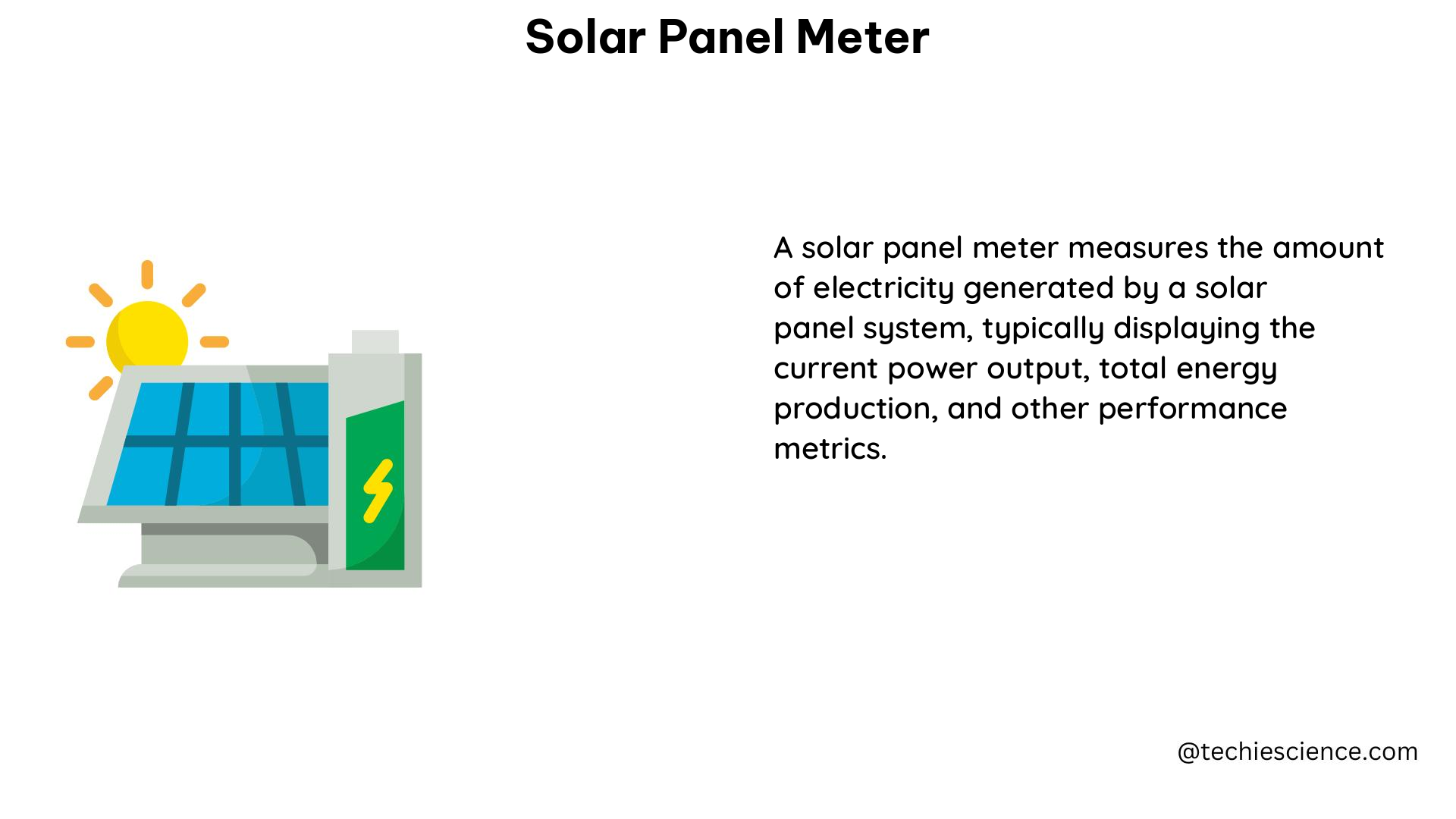A solar panel meter, also known as a solar energy meter, is a crucial device used to measure the amount of solar energy received by a solar panel system. It plays a vital role in monitoring the performance and efficiency of solar panel installations, ensuring optimal energy generation and cost-effectiveness.
Technical Specifications of Solar Panel Meters
Measurement Range
The measurement range of a solar panel meter is a crucial factor in accurately capturing the solar irradiance received by the solar panel system. The Hukseflux SR30 pyranometer, a renowned solar panel meter, boasts an impressive measurement range of 0-2000 W/m2, allowing it to precisely measure even the highest levels of solar radiation.
Accuracy
Accuracy is paramount when it comes to solar panel meters, as it directly impacts the reliability of the performance data. The Hukseflux SR30 pyranometer achieves an accuracy of ±5 W/m2 or ±5%, ensuring that the measurements are within a tight tolerance range.
Response Time
The response time of a solar panel meter is the time it takes for the device to respond to changes in solar irradiance. A fast response time is essential for accurately capturing the dynamic nature of solar energy generation. The Hukseflux SR30 pyranometer has an exceptional response time of less than 1 second, allowing it to quickly adapt to fluctuations in solar radiation.
Temperature Range
Solar panel meters must be able to operate accurately across a wide range of temperatures to accommodate various installation environments. The Hukseflux SR30 pyranometer has a temperature range of -40°C to +80°C, ensuring reliable performance in both extreme cold and heat.
Calibration
Regular calibration is crucial for maintaining the accuracy of solar panel meters over time. The Hukseflux SR30 pyranometer comes with a factory calibration that is traceable to international standards, ensuring consistent and reliable measurements.
Building a DIY Solar Panel Meter

Constructing a DIY solar panel meter can be a rewarding and educational project for those with a passion for electronics and renewable energy. To build a DIY solar panel meter, you’ll need the following key components:
-
Photodiode: A photodiode is a semiconductor device that converts light into electrical current. It serves as the primary sensor in a solar panel meter, responsible for detecting the incoming solar radiation.
-
Op-amp: An operational amplifier (op-amp) is an electronic component that amplifies the electrical signal from the photodiode, ensuring a strong and reliable input for the microcontroller.
-
Microcontroller: A microcontroller is a small computer that processes the amplified electrical signal from the op-amp and displays the solar irradiance on an LCD screen.
-
LCD Screen: The LCD screen is the visual interface that displays the solar irradiance measured by the solar panel meter, allowing users to monitor the performance of their solar panel system.
-
Resistors and Capacitors: Resistors and capacitors are essential components used to filter and amplify the electrical signal from the photodiode, ensuring accurate and stable measurements.
Building a DIY solar panel meter requires a solid understanding of electronics and programming. However, there are numerous online resources and guides available to assist you in this endeavor, making it an accessible project for hobbyists and DIY enthusiasts.
Advanced Features and Considerations
As solar panel technology continues to evolve, so too do the capabilities of solar panel meters. Some advanced features and considerations to keep in mind when selecting or building a solar panel meter include:
-
Wireless Connectivity: Integrating wireless communication capabilities, such as Wi-Fi or Bluetooth, allows solar panel meters to transmit data to mobile devices or cloud-based platforms, enabling remote monitoring and analysis.
-
Data Logging: Advanced solar panel meters often include data logging functionality, allowing users to record and analyze historical solar irradiance data, which can be valuable for performance optimization and troubleshooting.
-
Integrated Sensors: Some solar panel meters incorporate additional sensors, such as temperature and humidity sensors, to provide a more comprehensive understanding of the environmental conditions affecting solar panel performance.
-
Compatibility with Solar Inverters: Ensuring compatibility between the solar panel meter and the solar inverter used in the system can enable seamless integration and data sharing, providing a more holistic view of the solar energy generation process.
-
Durability and Weather Resistance: Outdoor solar panel installations require meters that can withstand harsh environmental conditions, such as extreme temperatures, precipitation, and UV exposure. Selecting a solar panel meter with a robust, weatherproof design is crucial for long-term reliability.
By understanding the technical specifications, building a DIY solar panel meter, and exploring advanced features, you can unlock the full potential of your solar panel system and optimize its performance for maximum energy generation and cost savings.
References
- Brown, J., Abate, A., & Rogers, A. (2021). Disaggregation of household solar energy generation using censored smart meter data. Energy, 231, 121365.
- OVO Energy Forum. (2024). How do I find how much power we actually use from solar panels? Retrieved from https://forum.ovoenergy.com/smart-meters-136/how-do-i-find-how-much-power-we-actually-use-from-solar-panels-17164
- U.S. Department of Energy. (2022). Understanding Solar Photovoltaic System Performance. Retrieved from https://www.energy.gov/sites/default/files/2022-02/understanding-solar-photo-voltaic-system-performance.pdf
- Hukseflux. (n.d.). Solar Energy Meters: Why Use Them in Measuring Solar Energy? Retrieved from https://www.hukseflux.com/library/solar-energy-meters-why-use-them-in-measuring-solar-energy

The lambdageeks.com Core SME Team is a group of experienced subject matter experts from diverse scientific and technical fields including Physics, Chemistry, Technology,Electronics & Electrical Engineering, Automotive, Mechanical Engineering. Our team collaborates to create high-quality, well-researched articles on a wide range of science and technology topics for the lambdageeks.com website.
All Our Senior SME are having more than 7 Years of experience in the respective fields . They are either Working Industry Professionals or assocaited With different Universities. Refer Our Authors Page to get to know About our Core SMEs.